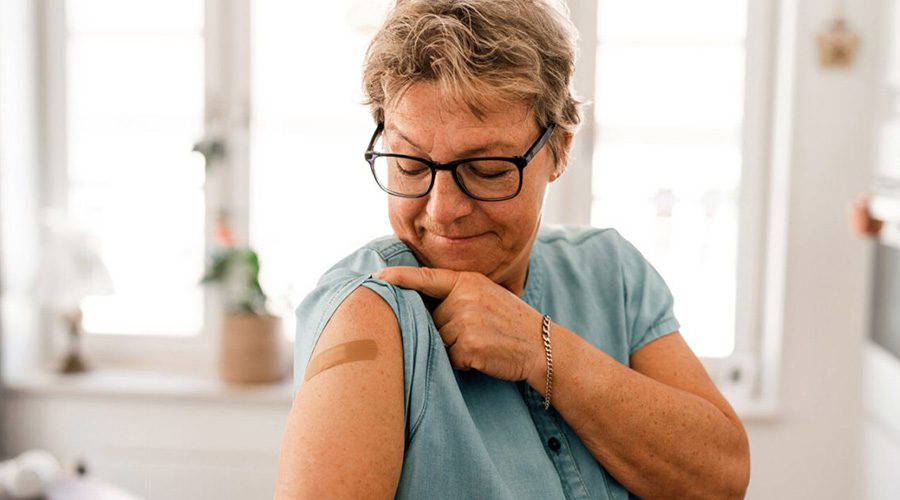Heart Inflammation Risk After COVID-19 Vaccine Is Real, But Very Rare
Healthline: HEALTH NEWS
Written by Shawn Radcliffe on October 7, 2021
Fact Checked by Dana K. Cassell
A new study of over 2.3 million people found only 15 cases of myocarditis occurred after getting a COVID-19 shot, suggesting that while it can occur, it’s extremely rare.
- A new study of a large, diverse population found that the risk of heart inflammation after mRNA COVID-19 vaccination is real, but it’s fairly mild and extremely rare.
- In a study of over 2.3 million people ages 18 and older, only 15 cases of myocarditis were identified. Thirteen of these cases occurred after the second shot, while two occurred after the first shot.
- The risk of myocarditis after COVID-19 has been found to be much higher.
The risk of heart inflammation after mRNA COVID-19 vaccination is a rare and fairly mild event, a large study in a diverse population shows.
Researchers examined the electronic health records of over 2.3 million Kaiser Permanente Southern California members ages 18 and older who received at least one dose of the Pfizer-BioNTech or Moderna-NIAID vaccine between December 2020 and July 2021.
They identified 13 cases of myocarditis after the second dose — a rate of 5.8 cases per million second doses given. Two cases occurred after the first dose, making for a much lower rate of 0.8 cases per million first doses.
“[This study] supports that this is a real phenomenon,” said Dr. Ira Taub, a Paediatric cardiologist at Akron Children’s Hospital, who was not involved in the research. “The risk, though, is very, very small.”
The findings were published on Oct. 4 in the JAMA Internal Medicine.
Young males at highest risk of heart inflammation
All 15 cases of myocarditis identified by researchers occurred in men between 20 and 32 years old, with an average age of 25. None of the men had a history of heart problems. About half had received the Pfizer-BioNTech vaccine, with the other half receiving the Moderna-NIAID vaccine.
All but one of the men reported chest pain between 1 and 5 days after vaccination.
The men were all hospitalized, but their symptoms improved with conservative treatment. None of them were admitted to the ICU or readmitted after being released from the hospital.
Notably, the new study included a diverse population: 37.8 percent were Hispanic, 31.2 percent white, 14.3 percent Asian and 6.7 percent Black. This helps generalize the results to the country as a whole.
Researchers also compared the risk of myocarditis after vaccination to the risk of this condition in people who were unvaccinated.
Myocarditis can also be caused by viral and bacterial infections, including COVID-19.
The risk of heart inflammation after the second dose was 2.7 times higher than the risk in a similar group of unvaccinated people.
Dr. Brian Kolski, director of the Structural Heart Disease Program at Providence St. Joseph Hospital in Orange County, California, said that there are limitations to the study. For example, it’s an observational study rather than a randomized trial, and there was a short follow-up time.
But he said that the results fit with other data on myocarditis after COVID-19 vaccination. “There’s nothing in this study that suggests we’re missing an epidemic of young males who are having problems with the vaccine,” he said.
Another limitation of the study is that it only included people 18 years and older. Myocarditis can also occur in younger people after vaccination.
Still, “if they’d included a paediatric population, the study would have shown substantially the same thing,” said Taub. “We are not seeing an avalanche of paediatric myocarditis cases as a result of vaccination.”
As with adults, children and adolescents who develop myocarditis after vaccination tend to recover quickly.
“Out of the children we’ve seen [at my institution], a couple needed to be hospitalized,” he said. “But everyone was discharged within a few days, no one was re-hospitalized, and all of their [heart] function was normal.”
Heart inflammation more common after COVID-19
Experts say the benefits of the vaccines still outweigh the rare risk of myocarditis, especially when compared to the risks of coronavirus infection.
In an Israeli study published last month, researchers examined the electronic health records of over 2 million people.
They found an additional 2.7 cases of myocarditis for every 100,000 people vaccinated with an mRNA COVID-19 vaccine.
But the risk of myocarditis after COVID-19 was higher, resulting in an extra 11 cases for every 100,000 people who had the infection.
This study didn’t take into account younger males specifically.
But the Centers for Disease Control and Prevention (CDC) estimated in June that there would be 56 to 69 cases of myocarditis for every million 12-to-17-year-old males who received the second dose.
Vaccination among this age group, though, would prevent an estimated 5,700 cases of COVID-19, 215 hospitalizations, and two deaths.
Taub says that people should keep in mind that children and adolescents who develop myocarditis after coronavirus infection can get very sick as a result.
However, “if they are treated, they bounce back pretty quickly,” he said. “We’re seeing kids in the clinic 6 months, 8 months, sometimes 10 months [after treatment], and for most of those kids, their [heart] function also eventually normalizes.”
Kolski said even with the small risk of myocarditis after vaccination, he’d still recommend that people get vaccinated against COVID-19.
However, given the greater risk of myocarditis in younger males after the second dose, two doses of the mRNA vaccine may not be appropriate for everyone.
“Maybe there’s a group of young, healthy males that only need one dose,” he said. “I think there’s some more nuanced conversations that have to occur.”
Both the United Kingdom and Hong Kong have opted to give certain adolescents a single dose of the mRNA vaccine. This provides them with some protection against COVID-19 but with a lower risk of myocarditis.

